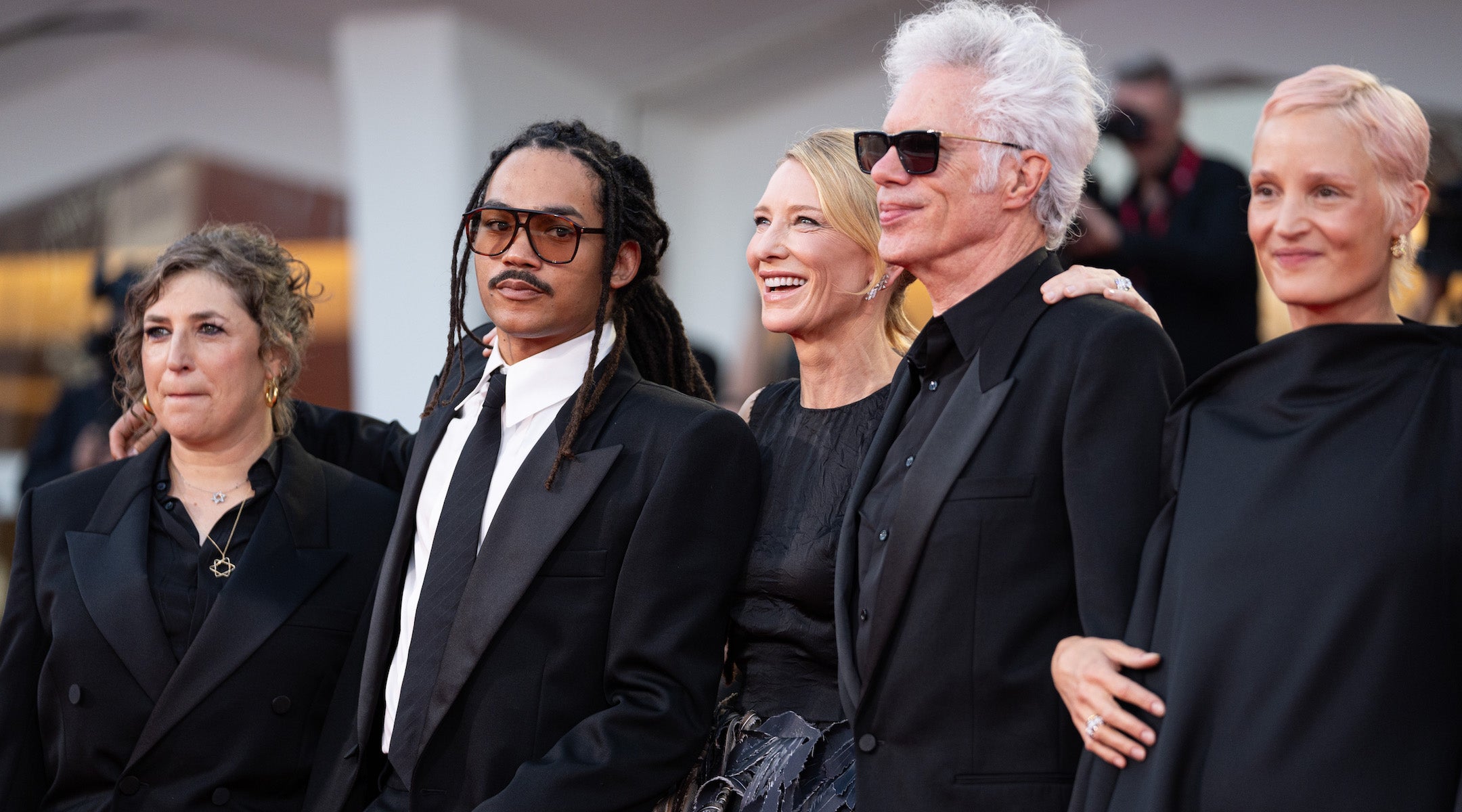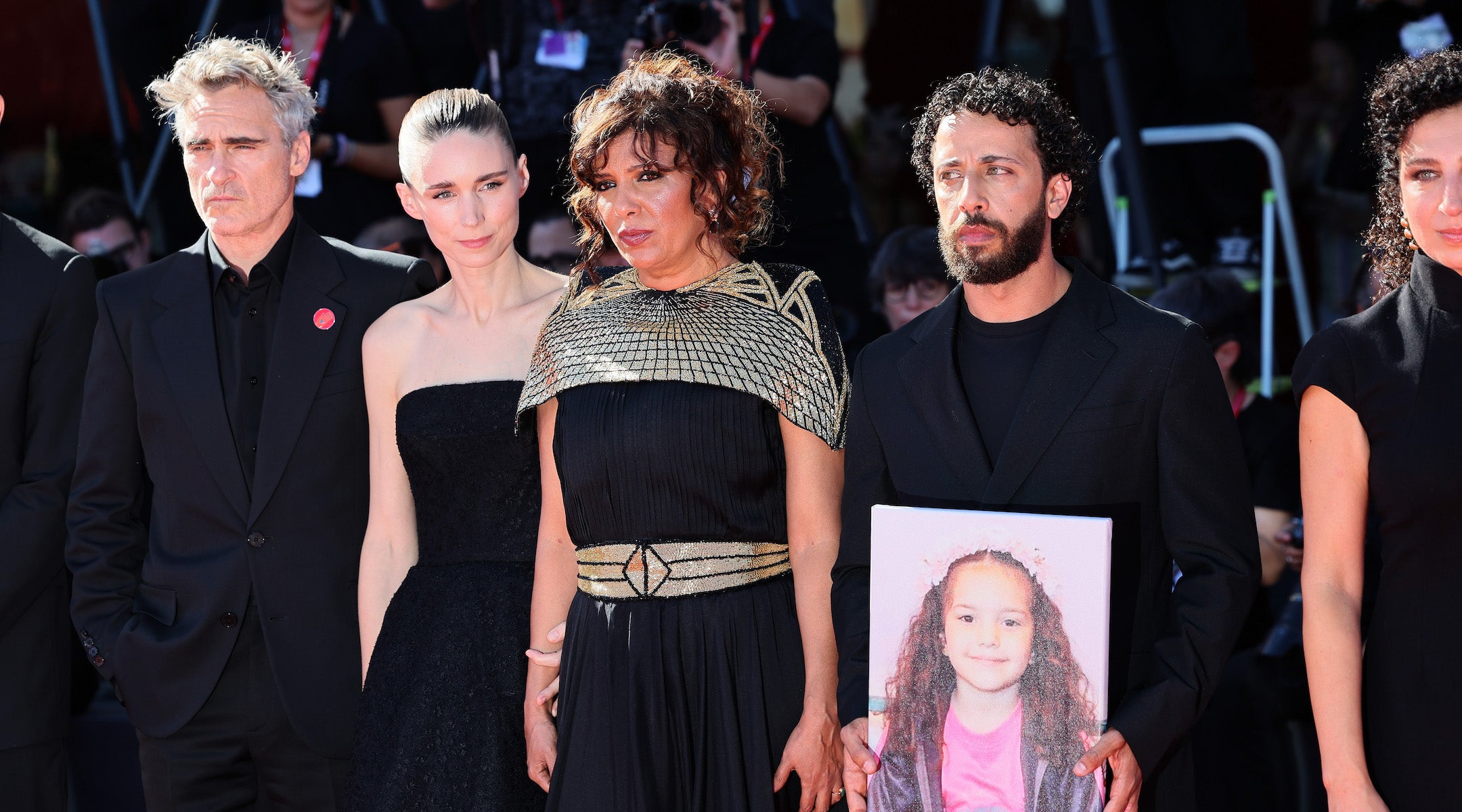A Palestinian-led docudrama about the Israel-Gaza war, executive-produced by Jewish director Jonathan Glazer, won a top prize at the Venice Film Festival, drawing what may have been a record ovation.
The Golden Lion for best film went to a family drama, “Father Mother Sister Brother,” whose stars include the pro-Israel activist Mayim Bialik. Bialik walked the red carpet at a festival that began with a large pro-Palestinian protest and faced unsuccessful pressure to withdraw invitations from some pro-Israel actors, including Gal Gadot, whose film “In the Hand of Dante” also premiered there.
The Palestinian film, “The Voice of Hind Rajab,” won the Grand Jury Prize, the prestigious festival’s second-place finish. The film, a minute-by-minute recreation of the heavily publicized death of 5-year-old Rajab in Gaza in 2024, received a 23-minute standing ovation when it premiered. Some in the crowd chanted “Free Palestine” after the film played.
Glazer’s participation follows his success directing “The Zone of Interest,” a Holocaust drama that received wide critical acclaim for its depiction of Nazi authorities living peacefully next to Auschwitz. While accepting the best international feature Oscar for the film in 2024, Glazer upset some in the Jewish community by criticizing Israel during his speech.
Glazer joined “Hind Rajab” as an executive producer after it was completed, shortly before its festival premiere, along with other A-list names including Jewish actor Joaquin Phoenix, Brad Pitt, and Rooney Mara.
The film is currently without a major U.S. distributor. Watermelon Pictures, a small American outlet focused on pro-Palestinian releases that last year backed the release of the documentary “Israelism,” is one of its partners. But Tunisia has submitted it as the country’s consideration for the best international feature Oscar, and its director, Kaouther Ben Hania, is a two-time Oscar nominee. Last year the Israeli-Palestinian documentary “No Other Land,” about the West Bank, won an Oscar without a distributor.
Ben Hania, accepting the Venice award, dedicated it to the Palestinian Red Crescent. The movie follows the organization’s failed efforts to send aid to Rajab when she was trapped in a car with family members who had been killed. A Washington Post investigation into Rajab’s killing reported that Israel had initially given permission for ambulances to reach her before later striking them.
In the film, made with permission from Rajab’s surviving family, who remain in Gaza, actors respond to the sounds of her real-life, 75-minute emergency phone call.
“The voice of Hind is the voice of Gaza itself, a cry for rescue the entire world could hear yet no one answered,” Ben Hania said in her speech, during which she also harshly condemned Israel. She continued, “Her voice is not hers alone. It is tragically the story of an entire people enduring genocide, inflicted by a criminal Israeli regime that acts with impunity.”
Rajab’s death has turned her into a larger symbol of the global pro-Palestinian movement. Columbia University protesters who occupied a school building last year renamed it “Hind’s Hall,” and the rapper Macklemore released a protest song of the same name. Palestinian authorities have used Rajab’s death to push for an International Criminal Court investigation against Israel, while the Belgium-based Hind Rajab Foundation seeks legal action against Israeli soldiers abroad.
At Venice, thousands of protesters marched in support of Palestinians, while jury president Alexander Payne, director of “The Holdovers” and “Sideways,” demurred when asked to make a statement about the war. He later rejected accusations that the Rajab film failed to take the top prize for political reasons.

Mayim Bialik, Luka Sabbat, Cate Blanchett, Jim Jarmusch attend the “Father Mother Sister Brother” red carpet during the 82nd Venice International Film Festival on August 31, 2025 in Venice, Italy. (Alessandro Levati/Getty Images)
Even the first-place finisher, from veteran filmmaker Jim Jarmusch, has not escaped controversy over Israel. Its distributor, the ascendant streaming service Mubi, is facing an internal staff revolt and pro-Palestinian activist pressure over a $100 million investment from venture firm Sequoia, with half of Mubi’s payroll signing an open letter attacking the firm’s links to the Israeli military.
Israeli directors Nadav Lapid (“Synonyms”) and Ari Folman (“Waltz With Bashir”) are among the outside voices criticizing the investment for what they described as “genocide profiteering.” At the festival prior to his win, Jarmusch said he was “disappointed” by the investment while adding, “All corporate money is dirty.”
Among the films that went home empty-handed in Venice was “Orphan,” a historical drama about Hungarian Jews navigating the country’s anti-Communist revolution in the 1950s. Director László Nemes, who based the film off his own family’s story, has directed an Oscar-winning Holocaust drama of his own, 2015’s “Son of Saul.” He harshly criticized Glazer’s Oscar speech last year, accusing the director of repeating “talking points disseminated by propaganda meant to eradicate, at the end, all Jewish presence from the Earth.”
The war reverberated outside of the official competition slate, too: Documentary premiere “Cover-Up,” about Jewish investigative journalist Seymour Hersh, links his controversial recent reports on Gaza to his past exposures of war crimes in Vietnam.
They are not the only films critical of Israel to be vying for attention this year. “Palestine ’36,” a historical epic about the Arab revolt against British rule in mandate-era Jerusalem, premieres this week at the Toronto International Film Festival; the film is funded by Saudi Arabia and will be this year’s Palestinian Oscar entry.
And “Yes,” a dark post-Oct. 7 satire from Lapid, was recently acquired for U.S. distribution and will also be competing Sept. 16 for best picture in the Ophir Awards, Israel’s equivalent to the Oscars. If the film, which harshly critiques Israel from within, wins the top Ophir prize, it would, according to the award’s tradition, automatically become Israel’s Oscar submission.
JTA has documented Jewish history in real-time for over a century. Keep our journalism strong by joining us in supporting independent, award-winning reporting.






